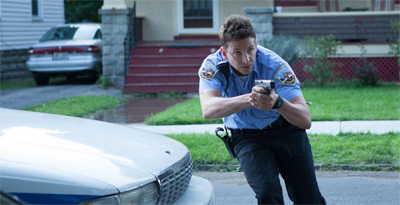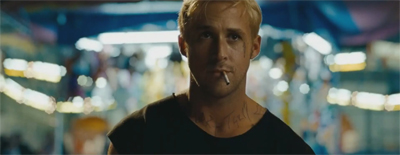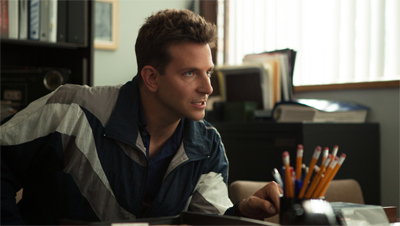This film was seen as part of the Jameson Dublin International Film Festival 2013.
The Place Beyond the Pines is a movie best seen without the weight of expectations. The safest thing I can probably say about The Place beyond the Pines is that it’s a compelling study of the multiple relationships between fathers and sons. Writer and director Derek Cianfrance has crafted a beautiful piece of cinema here. Running almost two-and-a-half hours, it makes the most of its extended runtime to draw the audience into the film, and to craft a rich and multi-faceted world the remains so intimate that actions ripple and consequences can’t be completely avoided, even if they can be temporarily evaded.
We follow motorbike stuntman “Handsome Luke” who suddenly discovers that he has a son, and contemplates the weight and obligation that it creates. “My father wasn’t around,” he explains to his ex-girlfriend, Romina, “and look how I turned out.” Luke’s desire to do right by his son creates a web of cause and effect that spans further than he probably ever contemplated, and The Place Beyond the Pines is a thoughtful examinations of duties that come with fatherhood, and the difficulties stemming from that.
Luke certainly has his heart in the right place. The Place Beyond the Pines works in a large part because it doesn’t judge Luke too harshly, but it avoids letting him off the hook. His desire to remain a part of his son’s life is certainly commendable, particularly when it would have been easy for him to move on and continue living his relatively comfortable life in the circus. His concerns about being shut out of his son’s life are legitimate, and the movie is considerate of that. His intentions are never treated as anything less than sincere.
It helps that Gosling is able to channel some tucked-away innocence inside Luke, with a sweet exchange about how he wants to be present when his son first tastes ice cream. “That way,” he explains, enthusiastically, “whenever he tastes ice cream, he’ll think of me.” It is a little naive, a little simplistic, a little innocent. However, the relationship that Luke desires to share with his son is far better than the dynamic between hero police officer Avery Cross and his politicking father Al. When Avery becomes a public figure, Al is less concerned about Avery’s wounds than he is about his chances of office. When Avery has a son of his own, his parenting style could be best described as “disinterested.”
And yet The Place Beyond the Pines never lets Luke off the hook. His intentions might be noble, but it’s still evident that he’s a broken man. Indeed, his plan to provide for his son involves robbing banks – hardly a sustainable career objective. Even his friend Robin points out that this is the kind of thing that you only get to do three or four times before you retire. More than that, though, Luke is violent and selfish. There are times when Luke exhausts the sympathy that his paternal sincerity engenders, which is a demonstration of just how well The Place Beyond the Pines works.
He doesn’t just want to be in his son’s life, he wants Rowina as his wife again. He intrudes into the house owned by Rowina’s current boyfriend, Kofi, as if he owns the place. He buys gifts that aren’t welcome, and offers money that isn’t accepted. When Rowina points out that she has moved on, Luke explains that Kofi can go off and find his own woman and have his own child. “That’s every man’s right,” Luke assures us, in a manner that suggests this is Luke’s attemp at magnimity.
Luke is introduced to us as a man riding a motorbike – perhaps one of the most iconic images of freedom in modern American popular consciousness. He can ride like nobody’s business. Trying to deal with the frustration over his family situation, he rides into the woods and he moves so fast it’s hard to keep track. (The scene is shot and editted fantastically.) He clearly gets a thrill of riding at absurd speeds away from the pursuing cops, so excited he even considers multiple robberies on the same day.
The irony, of course, is that we’re introduced to Luke riding his bike inside a cage. The meaning is clear. There is only so much freedom that Luke can actually accomplish, only so far he can venture from a certain point before he is brought around again. In a way, that fantastic opening shot of three motorcyclists inside a metal sphere is a perfect metaphor for the film itself – all these characters trapped in orbit with one another, all these unspoken and unseen consequences, all these inevitable collisions in The Place Beyond the Pines.
Promising police officer Avery Cross has his own problems. His father is present, but not necessarily the most overtly affectionate. Al cares for his son deeply, but in a way that doesn’t necessarily show as clearly. Al clearly wants his son to succeed him as DA, something Avery seems reluctant to do. Perhaps that distance is passed down from father-to-son-to-grandson, as Avery tends to ignore his own son’s needs. Avery is better able to provide for his own son’s material wants than Luke ever was, but it’s quite clear that he lacks the same investment in his role as a father.
Director Derek Cianfrance does an amazing job with The Place Beyond the Pines. Structurally, he does something quite brilliant that twists the narrative in a way that seems shocking, but is actually quite brilliant – it’s the best kind of narrative sucker punch, the one that improves the quality of the pay-off, rather than distracting from the lack of one. These lives intersecting, these fathers and sons who find themselves trapped in familiar circumstances, carrying unspecified amounts of personal baggage inherited from their parents, it is very well put together.
The film is fantastically well-constructed. Sean Bobbitt’s cinematography is stunning. He gives the film the look of an epic that just happens to be shot in Schenectadya, perhaps a place that doesn’t naturally lend itself to epics. The result is a curiously intimate but sweeping drama that takes on a larger-than-life aspect while remaining relatively grounded. It sounds contradictory, and it is, but in a stunningly clever sort of way. Mike Patton’s score adds a lot to the film.
That said, there are a few problems. For one thing, the female characters feel a little shallow – although that is probably to be expected in a drama that is so keenly focused on the relationships between men and their children. It feels like a bit of a waste of Rose Byrne and Eva Mendes, two actresses who are typically much stronger than the material they appear in. Still, you could argue that it is expected. It’s just slightly frustrating that, in a story with so many well-drawn characters, that the women feel like an after-thought.
There’s also the movie’s length. It’s not really a problem. There’s no way you could trim it and maintain the same sort of mood. At the same time, The Place Beyond the Pines is occasionally overwhelming, as the atmosphere and mood build to the point where they are almost suffocating. Cianfrance smartly balances some of this heavy drama with moments of levity and wit, but there are points where the drama threatens to get a bit too oppressive.
On the other hand, the cast is superb. Ryan Gosling is amazing, as he typically is, bringing a surreal tenderness to his violent and simplistic outlaw biker. Bradley Cooper is developing into a tremendous dramatic talent. It’s great to see Harris Yulin in anything, and roles for Ray Liotta and Dane DeHaan are appreciated. In a drama of this scope that is still fixated on character, it’s important to have a skilled cast, and The Place Beyond the Pines does fantastically in this respect.
The Place Beyond the Pines is potent and powerful stuff. It’s shrewdly constructed, and a film that really deserves to be seen with an open-mind. It’s a thoughtful look at actions and reactions, cause and consequence, and the dysfunctional relationships between fathers (absent or present) on their children, and the long-term effects of those dynamics.
I don’t normally rate films, but the Jameson Dublin International Film Festival asks the audience to rank a film from 1 (worst) to 4 (best). In the interest of full and frank disclosure, I ranked this film: 3
Filed under: Non-Review Reviews | Tagged: arts, Avery, bradley cooper, Derek Cianfrance, dublin, Eva Mendes, Film festival, jameson dublin international film festival, Jameson Dublin International Film Festival 2013, Luke, Mike Patton, Movie, Pines, Place Beyond the Pines, robin, Rose Byrne, Ryan Gosling, United States |



























I’ve been looking forward to this a while, glad to hear you liked it. Cianfrance has placed himself into my group of directors whose work I anticipate.
I feel bad that I saw it so early in the festival. I’d given out two 4/4’s so far, and I was perhaps a bit stingy early in the second week. I didn’t want to grade too soft. The Place Beyond the Pines skirts the line between a 3/4 and a 4/4, like A Hijacking or even Much Ado About Nothing.
Reblogged this on mattybobobo's Blog.
Thanks. Hope you enjoy!
tweeted for u.